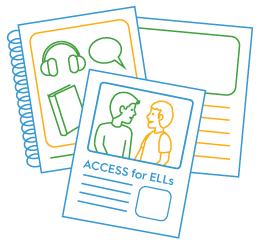Resources/Recursos
Featured Resources



All resources/Todos los recursos
Filter resources by:
Resources/Recursos
WIDA Speaking Rubric Grades 1-12
Use the WIDA Speaking Rubric to understand the scores students earn on ACCESS for ELLs (Online and Paper), analyze student performance in the classroom, and plan ways to scaffold language learning.
Note: Do not use this rubric to score WIDA assessments. Find relevant scoring tools in the appropriate WIDA assessment training course.
Resource Details View Download NowReleased January 2020
WIDA Writing Rubric Grades 1-12
Use the WIDA Writing Rubric to understand the scores students earn on ACCESS for ELLs (Online and Paper), analyze student performance in the classroom, and plan ways to scaffold language learning.
Note: Do not use this rubric to score WIDA assessments. Find relevant scoring tools in the appropriate WIDA assessment training course.
Resource Details View Download NowReleased January 2020
Oral Language in the Classroom
This Focus Bulletin explores the kind of spoken English language that multilingual learners benefit from developing, showing how that oral language is described in WIDA standards resources and assessed on the ACCESS for ELLs Speaking test.
Published October 2019
Authors: Mark Chapman, Dale Erlandson
Released November 2019
Guiding Principles of Language Development (multiple languages)
These guiding principles of language development and learning exemplify WIDA’s overarching foundational beliefs and ever-present Can Do Philosophy. The guide includes research citations and defines WIDA's use of the term multilingual learner.
This guide, available in multiple languages, can be used as a resource for educators to share with parents and families.
Resource DetailsReleased September 2019
Less Than Four Domains: Creating an Overall Composite Score as an Indicator of English Language Proficiency for English Learners with 504 or Individualized Education Plans
The illustrated models and procedures can be applied to calculate overall composite scores to identify an indicator of English language proficiency, based on composite scores for English learners with 504 or individualized education plans who are missing one or more domain scores on the Assessing Comprehension and Communication in English State-to-State for English Language Learners assessment for state monitoring, achievement and accountability determinations.
Resource DetailsReleased May 2019
WIDA MODEL and ACCESS for ELLs Concordance Table
WIDA research findings show that MODEL Online overall composite scale scores can predict overall composite proficiency level (PL) scores on ACCESS for ELLs. Use the table in this document to look up a student's overall composite scale score on MODEL Online and estimate the PL score that they would be likely to receive on ACCESS.
Resource Details View Download NowReleased April 2019
Investigating K-12 English Learners' Use of Universal Tools Embedded in Online Language Assessments
This study examined how English learners in grades 1-12, with and without disabilities, used online accessibility features during an ELP assessment. These accessibility features are designed to provide the necessary support for the general EL population, including ELs with disabilities.
Published March 2019
Authors: Ahyoung Alicia Kim, Meltem Yumsek, Mark Chapman, H. Gary Cook
Released March 2019
Understanding Language Proficiency to Develop Language Goals, Grades K-5
These lesson plans (with accompanying worksheets) guide grades K-5 students in understanding language proficiency, determining their own strengths, and setting goals for language development.
Resource Details View Download NowReleased December 2018
Understanding Language Proficiency to Develop Language Goals, Grades 6-12
These lesson plans (with accompanying worksheets) guide grades 6-12 students in understanding language proficiency, determining their own strengths, and setting goals for language development.
Resource Details View Download NowReleased December 2018
Choosing an Interim Assessment: Guidelines for Stakeholders
This document describes WIDA's viewpoint of the criteria for an assessment to be used as a valid interim English language proficiency assessment in support of the annual administration of WIDA ACCESS.
Resource Details View Download NowReleased November 2018
Examination of Identification and Placement Decisions Made for K–12 English Learners
This study examines how 476 K–12 educators in 35 U.S. states identify and place English learners in language instruction educational programs. Findings reveal information about these educators, the instruments and information sources they use for decision making, and their perceived appropriateness of the decisions. Results provide practical implications for improving the English learner identification and placement decision at the district and school levels.
Resource DetailsReleased October 2018
WIDA English Language Development Standards and Resource Guide, International Edition
WIDA intends to fully retire the WIDA English Language Development Standards and Resource Guide, International Edition: Kindergarten-Grade 12. However, we recognize that schools have different timelines for implementation of the updated WIDA ELD Standards Framework, 2020 Edition. With that in mind, the earlier International Edition will remain in the Resource Library so that schools that are still using it may access it as needed.
The international edition of the 2012 Amplification of the WIDA English Language Development Standards was developed in response to growing interest from educators outside the U.S. for standards and assessments that can support and document the development of academic English among their students.
The 2012 ELD Standards Framework represented the social, instructional and academic language that students need to engage with peers, educators, and the curriculum in schools and included examples of how language is processed or produced within a particular context through Model Performance Indicators (MPIs). MPIs were meant to be examples and not fixed guidelines of the language with which students may engage during instruction and assessment.
Resource Details View Download NowReleased August 2017
Including Recently Arrived English Learners in State Accountability Systems: An Empirical Illustration of Models
Based on a U.S. Department of Education guide, these model analyses illustrate procedures a state could use to compare and contrast school-level overall and English learner accountability determinations for proficiency in reading/language arts. These examples are provided only to illustrate how a state could undertake them as part of its efforts to develop and explore a theory of action for assessment of recently arrived English learners.
Resource DetailsReleased March 2017
2012 Amplification of the WIDA English Language Development Standards
The 2012 Amplification of the WIDA English Language Development Standards, Kindergarten-Grade 12, represented the social, instructional, and academic language students might need to engage with peers, educators, and the curriculum in schools. The 2012 Amplification included examples of how language could be processed or produced within a particular context through Model Performance Indicators (MPIs). MPIs were meant to be examples and not fixed guidelines of the language with which students may have engaged during instruction and assessment.
WIDA intends to fully retire the 2012 Amplification of the WIDA English Language Development Standards, Kindergarten-Grade 12. However, we recognize that all member SEAs have different timelines for implementation of the WIDA ELD Standards Framework, 2020 Edition. With that in mind, the 2012 Amplification will remain in the Resource Library so that educators whose SEAs are still using it may access it as needed.
Resource Details View Download NowReleased March 2017
Providing ELLs With Disabilities Access to Complex Language
This WIDA Focus Bulletin outlines ways in which educators can provide English Language Learners with disabilities access to complex language via classroom activities and engagement opportunities.
Published March 2017
Authors: Lynn Shafer Willner, Cynthia Lundgren, Mira Monroe, Julia Cortada
Released February 2017
Getting Students Ready for ACCESS for ELLs Paper
General advice to teachers who want to help prepare their students to take ACCESS for ELLs Paper.
Resource Details View Download NowReleased November 2016
Performance Definitions - Expressive Domains
This document contains the performance definitions for the expressive domains of speaking and writing.
Resource Details View Download NowReleased November 2016
Performance Definitions - Receptive Domains
This document contains the performance definitions for the receptive domains of listening and reading.
Resource Details View Download NowReleased November 2016
Interpretation and Use of K–12 Language Proficiency Assessment Score Reports: Perspectives of Educators and Parents
This paper examine how 18 K–12 educators from 13 states and 12 parents from two states interpret and use score reports from the WIDA ACCESS for ELLs. Educators frequently referred to the proficiency level index of the four language domains of listening, speaking, reading, and writing, and the composite domains to interpret student performance, to make school-level decisions about programming and lesson planning, and to inform district-level budgeting and professional development. Parents found the score report to be helpful, but rarely took additional actions to use its information.
Resource DetailsReleased November 2016
WIDA Accessibility and Accommodations Framework
The WIDA Accessibility and Accommodations Framework consists of the application of effective linguistic scaffolding and Universal Design principles to the development of test items, use of administrative considerations and purposeful design and delivery of universal tools and accommodations.
Resource Details View Download NowReleased September 2016




